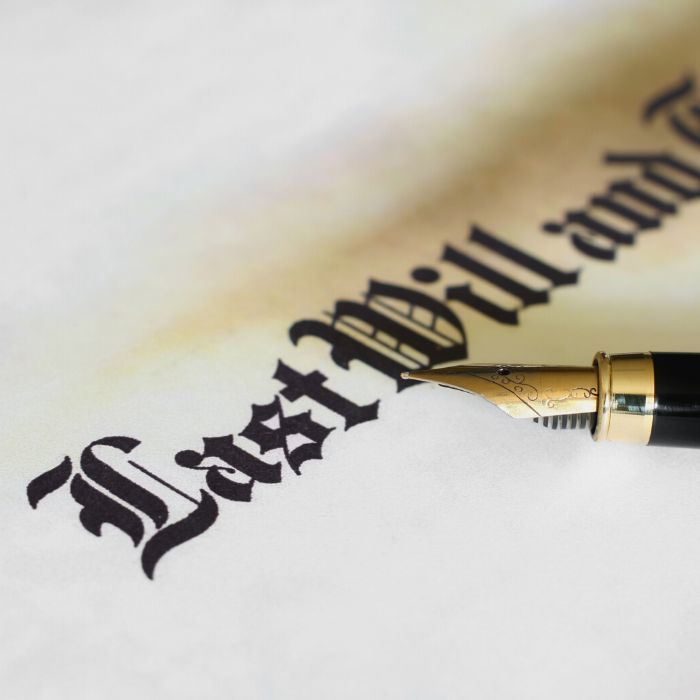Making a Will
Protecting Your Future Legacy Today
Preparing a Will in Australia
If you want peace of mind knowing that when you pass on, your estate will be fairly apportioned in line with your wishes — it’s crucial you understand the process of making a Will.
Should you fail to create this legacy document by the time of your death — known as dying intestate — statutory procedures take over. This means that the court will appoint an administrator to allocate your treasured possessions, property, and funds.
In short, parts of your estate may be given to people you consider undeserving.
However, while writing a Will is essential to fulfilling your intentions, there are numerous pitfalls to avoid — to ensure it’s not challenged or contested after your passing. A legally ambiguous Will is as risky as having no Will at all.
Falzon Legal will guide you patiently and compassionately through the entire process. Not just ensuring that your intentions today are fulfilled tomorrow, but also that your wishes cannot be questioned after you have departed.
Who Can Write a Will?
All Australians aged 18 years or more are entitled to create a Will — as long as they meet the criteria of Testamentary Capacity.
This judicial term simply indicates that the person has both the legal authorisation and mental capacity necessary to make a Last Will and Testament.
In Australia, it’s assumed automatically that adults have Testamentary Capacity — unless proven otherwise.
The criteria, outlined by Banks v Goodfellow (1870), are that the testator — the person making the Will — can meet the following:
- Understand the outcomes and consequences of creating a Will.
- Know the scope of their assets in their entirety.
- Comprehend the existence of any moral claims on their estate.
- Be of sound judgement and mind.
Furthermore, once the Will is written, it needs to be:
- In writing — that is, not in audio format.
- Signed by the Testator.
- Have two witnesses sign the Will — not a beneficiary or spouse.

What You Need To Begin Writing a Will
When you’ve decided to get a Will, the first step is always to gather together all the information required. Ensuring that you have all the necessary material and detail at the outset prevents wasting time in the future, allows you to consider all aspects holistically, and leads to a more accurate and watertight legacy.
At the very least, the information you need is:
- Inventory of your assets — property, vehicles, physical possessions, investments, and superannuation.
- Banking details — including account numbers.
- The full names, dates of birth, and addresses of all your beneficiaries — that is, those who will share in your estate after your passing.
- Explicit sums or gifts that you wish to leave to an organisation or person — for example, a specific lump sum for a charity or heirloom to a particular family member.
- Your funeral details if prepaid and arranged.
- The Executor — the person who will manage and distribute your estate after you pass on.
Once you have collated all the necessary details — and are comfortable and content with how you wish your legacy to be allocated — it’s time to commence writing the Will.
Chat With Us About the Information You Need To Create a Valid Will
How To Write a Will
Generally speaking, there are three ways to write a Will in Australia — a Do-It-Yourself Will kit, through the Public Trustee Office, or with the experienced assistance of a specialist Wills and Estates lawyer.
Do-It-Yourself Wills
Just as you can visit Bunnings and purchase everything you need to install a shower system without a plumber — you can do the same for Wills.
Until recently, the only option for creating a Will for yourself was to buy the paper format Will Kit from Australia Post or newsagent. With elegant typefaces and legal terms, they appear perfectly legitimate — your only task is to simply fill in the blank spaces.
Today, the paper version has naturally migrated to the free online will. Offered by an absolute plethora of providers — it’s incredibly straightforward. Just complete the online boxes with your personal information and legacy intentions, agree with the terms and conditions, pay a fee, and then print and sign.
The attractions of a DIY Will are clear — it’s very cheap, can be made in under an hour, you can do it from your armchair, and you don’t have to interact with a professional.
However, the potential downsides are serious, significant, and concerning.
Just a handful of examples of issues that can arise include:

- No mention of the Will revoking and superseding all other Wills.
- Appointing an unsuitable person as Executor.
- Incorrectly gifting estate out of the permissible assets — such as superannuations, trusts, and jointly-owned real estate.
- Ambiguous or incorrect language not recognised by law.
- Failure to meet statutory requirements — for example, witnesses signing in the wrong place, or not at the same time, or with the same pen.
Just one seemingly insignificant omission or error could lead to a successful contest or challenge to your intended legacy. Meaning, not only may your wishes be ignored or refuted, but also lead to considerable costs due from your estate, and time, stress and heartache for your loved ones.
The Public Trustee Wills (NSW)
For a significant amount of time, the Public Trustee (or in NSW, Trustee and Guardian) has offered a free Will writing service, or Wills at a significantly low price.
This state governmental department traditionally attends to the affairs of those who cannot manage themselves financially, lack the cognitive ability to deal with day-to-day cash issues, or the funds of person’s who are in prison. And, they will also create a free Will for you.
However, while you may receive your legacy document at little or no charge, that doesn’t mean that they receive no reimbursement. Instead, they typically utilise the funds from your estate.
Usually, the Will is prepared free of charge — as long as the Public Trustee is named as both Executor and Trustee — meaning your estate is charged fees for administration after your passing.
These expenses are significantly higher than those charged by a solicitor — this means your family and loved ones receive a reduced inheritance. In Queensland, the practice of overcharging and double-billing became so prevalent that the Public Advocate needed to intervene, audit the Trustee, and demand improvements.
Additionally, other common problems with obtaining a free Will from the Public Trustee include:
- No guarantee your Will is prepared by a legal professional.
- Significantly long administration time.
- Double-billing — your estate being charged more than once for the same service.
- Poor communication with family and beneficiaries.
- Over-charging.
- Lack of willingness to be proactive in Will disputes.
- Cannot deal with:
- Discretionary trusts.
- Mutual Will contracts.
- Wills for people who own businesses.
- Wills that include overseas assets.
Unless your affairs are extremely straightforward, you hold few assets, and there are minimal beneficiaries — using the Public Trustee could mean your estate becoming significantly depleted after your demise through excessive charging.
Wills and Estates Lawyer
A professional Wills and Estates lawyer has the legal knowledge, experience, and dedication to create an effective and robust Last Will and Testament.
Unlike the DIY Will and Public Trustee options, a skilled solicitor can address any level of complexity in your legacy affairs. Furthermore, in addition to the creation of the Will itself, they can advise and implement action on associated legal tools — including Enduring Guardianship, Power of Attorney, Testamentary Trusts, and Medical Care Directives.
And, in contrast to the Public Trustee and generic off-the-shelf-Will providers — a respected estate lawyer takes the time to understand you and your personal situation.
Typically, they will offer solutions and guidance that you had never considered — including ways to protect your estate from mishandling, efficient tax protocols, and action you can take today to save your loved ones additional expense in the future.
Perhaps most crucially, utilising the help of an estate and Wills solicitor is the only pathway to ensure your legacy is distributed in accordance with your wishes. Remember, just one simple omission or error can lead to your Will being contested or challenged.
While far from exhaustive, the benefits of using a lawyer to make your Will include:
- Extensive knowledge of the law.
- Experience in creating Wills that adhere to legal requirements.
- Shielding against the risk of future disputes.
- Suggesting tax-beneficial strategies.
- Formulating a Will that’s personal to you and your situation.
- Ensuring your wishes are met after your passing.
- Reducing the likelihood of family disputes.
- Someone available to discuss, change, or amend your Will when required.
- Offering additional estate support with Powers of Attorney, Enduring Guardianship, or Testamentary Trusts.
Talk to Us Today About How To Create a Will
The Cost of Making a Will With a Lawyer
The cost of making a Will with a solicitor is dependent upon your personal circumstances.
For example, if you have few assets and a straightforward bequeathment, the price is minimal. Conversely, should you have complex affairs that require the creation of Testamentary Trusts, Power of Attorney, and Medical Care Directives, the cost will be higher.

The most common factors affecting the price of a Will prepared by a solicitor are:
- If you plan on bequeathing specific persons or organisations gifts.
- Whether you are part of a blended family — i.e. in a relationship where one or more members have children from a previous partnership.
- If you’re divorced, separated, or have remarried.
- Should you leave something you own to joint parties.
- Whether you wish to exclude someone from your Will, who would normally be expected by blood or marriage to be included.
- If you require a trust as part of your Will.
- Should you need Power of Attorney or Care Directives arranged.
- Whether you want to leave your share of a jointly owned asset — such as property — to someone not currently part of the arrangement.
However, perhaps the crucial question is not how much does a Will cost from a solicitor, but how much would it cost you or your loved ones if it’s not prepared professionally.
Opting for an online, one-size-fits-all Will can leave your legacy open to challenge. Or, mean excessive future expenses being charged to your estate to reconcile and make good errors or omissions.
Falzon Legal — The Compassionate and Affordable Approach To Creating a Will
Planning and creating your Will can be complex, poignant, and emotionally charged. At Falzon Legal, we guide you compassionately and professionally through the entire process.
Meeting face-to-face — at our office, your home, or place of residential care — we allow you to speak at a pace and intensity that’s most comfortable for you. Together, we form a trusted partnership that leads to constructive, honest, and open formation of your legacy.
And, unlike many lawyers, we don’t charge by the hour.
With no time pressures, you’re free to explain the nuances and characteristics of your truly personal and individual situation. Allowing us to create a Will for you that not only addresses today — but also considers the practicalities if your assets, cognitive health, or physical wellbeing circumstances deteriorate.
Continually supportive, we ensure that your legacy wishes are completely and accurately represented in your Last Will and Testament.
Protecting against future challenge or contest, our conscientious approach means our Will documents are often six or seven pages in length. This is in contrast to just a couple of leaves from other practitioners. Ensuring that when you pass, your complete intentions are flawlessly fulfilled.

Making Your Will FAQs
How To Get a Will Cheap?
Online DIY Wills are the most affordable way to obtain a legacy document. However, they’re only suitable for people with the most straightforward of estate circumstances, and can leave the Will open to contest and challenge.
Who Needs a Will the Most?
While those with families, a partner, or extensive assets should in all circumstances make a Will — it’s advisable for everyone to have their estate legacy organised before their death.
How To Make a Will Online?
Numerous online providers will, for a fee, create a basic Will. However, as this is often nothing more than filling in blank boxes, the legality and robustness of the document can be seriously questionable.
One small error or omission can make the Will invalid or open to challenge. Furthermore, they’re unsuitable for anyone with even slightly complicated estate matters. Instead, consult an experienced Wills and Estates Lawyer.
What You Should Never Put In Your Will?
Your Will should not include anything that is either irrelevant to your estate nor permitted by law — a respected Will Lawyer will advise on what you should include.
For example, you cannot leave your inheritance to your cat — as this is not allowed under Australian legislation. Furthermore, you cannot place conditional instructions — e.g. stating that your brother can inherit your valuable gold watch if he splits up with his girlfriend.
What Happens to a Bank Account When Someone Dies Without a Will?
Passing on without a Will is known as dying intestate. In these circumstances, your next of kin will need a Letter of Administration — arranged by a solicitor — to permit them to administer the bank account.
At What Age Should You Write a Will?
In Australia, anyone aged 18 years or over can create a Will. While most people write their Last Will and Testament at age 50 years or over, it’s advisable to ensure you have a document in place as soon as you have assets. Otherwise, intestacy laws will decide what happens to your estate — not you.

